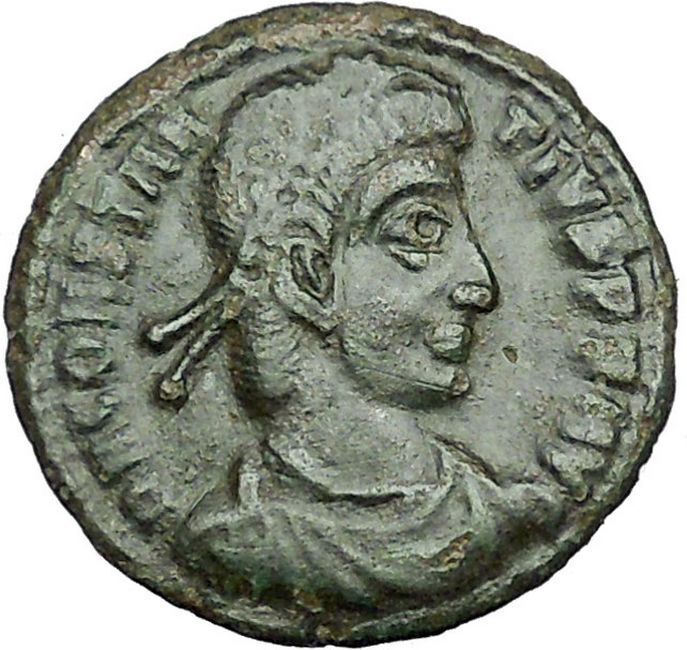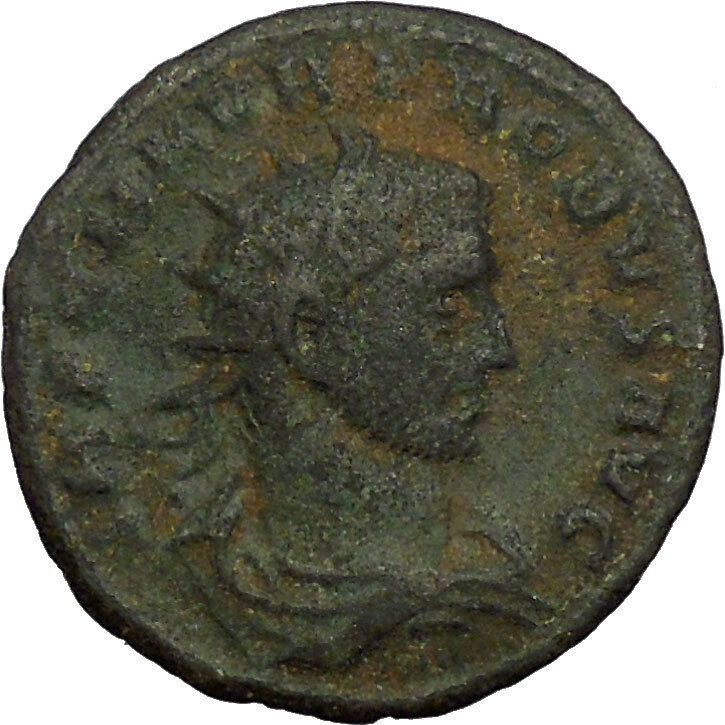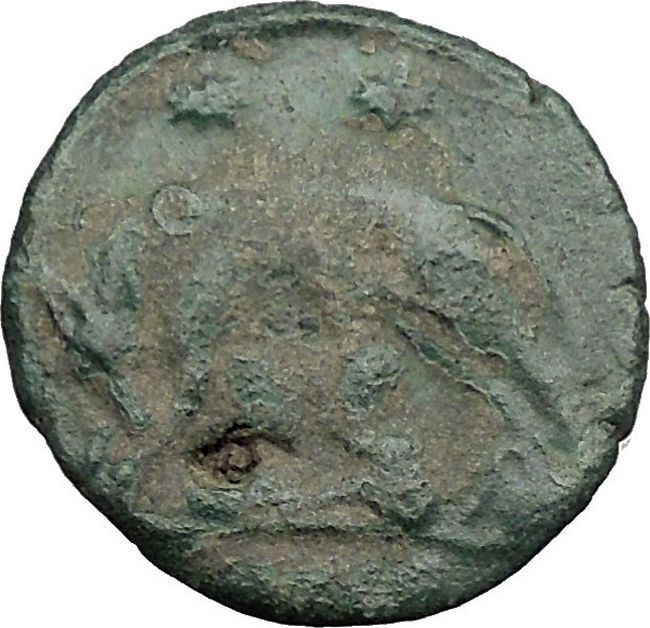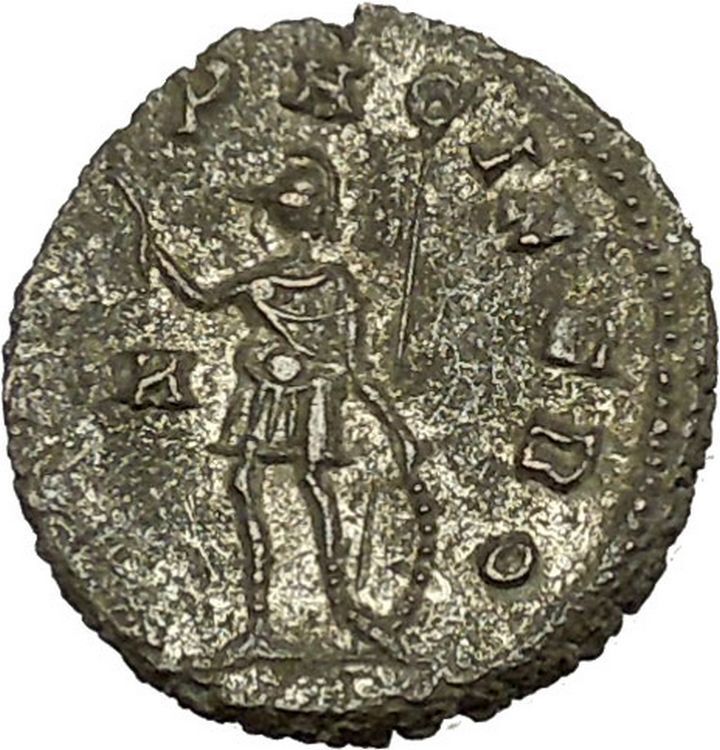|
Severus Alexander – Roman Emperor: 222-235 A.D.
Silver Denarius 18mm (2.92 grams) Antioch mint: 223 A.D.
Reference: RIC 293, S 7889, C 196
IMPCMAVRSEVALEXANDAVG – Laureate, draped bust right.
PIETASAVG – Pietas standing left, sacrificing over altar and holding incense box.
You are bidding on the exact item pictured, provided with a Certificate of Authenticity and Lifetime Guarantee of Authenticity.
Pietas, translated variously as “duty”, “religiosity” or “religious behavior”,”loyalty”,”devotion”, or “filial piety” (English “piety” derives from the Latin), was one of the chief virtues among the ancient Romans. It was the distinguishing virtue of the founding hero Aeneas, who is often given the adjectival epithet pius throughout Vergil‘s epic Aeneid. The sacred nature of pietas was embodied by the divine personification Pietas, a goddess often pictured on Roman coins. The Greek equivalent is eusebeia.
Cicero defined pietas as the virtue “which admonishes us to do our duty to our country or our parents or other blood relations.” The man who possessed pietas “performed all his duties towards the deity and his fellow human beings fully and in every respect,” as the 19th-century classical scholar Georg Wissowa described it.

Livia wife of Augustus as Pietas
As virtue
Pietas erga parentes (“pietas toward one’s parents”) was one of the most important aspects of demonstrating virtue. Pius as a cognomen originated as way to mark a person as especially “pious” in this sense: announcing one’s personal pietas through official nomenclature seems to have been an innovation of the late Republic, when Quintus Caecilius Metellus Pius claimed it for his efforts to have his father, Numidicus, recalled from exile. Pietas extended also toward “parents” in the sense of “ancestors,” and was one of the basic principles of Roman tradition, as expressed by the care of the dead. Pietas as a virtue resided within a person, in contrast to a virtue or gift such as Victoria, which was given by the gods. Pietas, however, allowed a person to recognize the divine source of benefits conferred.
The first recorded use of pietas in English occurs in Anselm Bayly’s The Alliance of Music, Poetry, and Oratory, published in 1789.
Iconography

Denarius of Herennius, depicting Pietas and an act of pietas.
Pietas was represented on coin by cult objects, but also as a woman conducting a sacrifice by means of fire at an altar. In the imagery of sacrifice, libation was the fundamental act that came to symbolize pietas.
Pietas is first represented on Roman coins on denarii issued by Marcus Herennius in 108 or 107 BC. Pietas appears on the obverse as a divine personification, in bust form; the quality of pietas is represented by a son carrying his father on his back.Pietas is among the virtues that appear frequently on Imperial coins, including those issued under Hadrian.
One of the symbols of pietas was the stork, described by Petronius as pietaticultrix, “cultivator of pietas.” The stork represented filial piety in particular, as the Romans believed that it demonstrated family loyalty by returning to the same nest every year, and that it took care of its parents in old age. As such, a stork appears next to Pietas on a coin issued by Metellus Pius (on whose cognomen see above).
As goddess

Flavia Maximiana Theodora on the obverse, on the reverse Pietas holding infant to her breast.
Pietas was the divine presence in everyday life that cautioned humans not to intrude on the realm of the gods. Violations of pietas required a piaculum, expiatory rites.
A temple to Pietas was vowed (votum) by Manius Acilius Glabrio at the Battle of Thermopylae in 191 BC.
According to a miraculous legend (miraculum), a poor woman who was starving in prison was saved when her daughter gave her breast milk (compare Roman Charity). Caught in the act, the daughter was not punished, but recognized for her pietasas. Mother and daughter were set free, and given public support for the rest of their lives. The site was regarded as sacred to the goddess Pietas (consecratus deae)pietas erga parentes
 Severus Alexander – Roman Emperor: 222-235 A.D. Severus Alexander – Roman Emperor: 222-235 A.D.
Caesar: 221-222 A.D. (under Elagabalus)
| Son of Julia Mamaea | Husband of Orbiana | Grandson of Julia Maesa | Nephew of Julia Soaemias | Cousin of Elagabalus | Second-cousin of Caracalla and Geta | Great-nephew of Septimius Severus and Julia Domna |
Marcus Aurelius Severus Alexander (October 1, 208–March 18, 235 AD), commonly called Alexander Severus, was the last Roman emperor (11 March 222–235) of the Severan dynasty. Alexander Severus succeeded his cousin, Elagabalus upon the latter’s assassination in 222 AD, and was ultimately assassinated himself, marking the epoch event for the Crisis of the Third Century—nearly fifty years of disorder, Roman civil wars, economic chaos, regional rebellions, and external threats that brought the Empire to near-collapse.
Alexander Severus was the heir apparent to his cousin, the eighteen-year-old Emperor who had been murdered along with his mother by his own guards—and as a mark of contempt, had their remains cast into the Tiber river. He and his cousin were both grandsons of the influential and powerful Julia Maesa, who had arranged for Elagabalus’ acclamation as Emperor by the famed Third Gallic Legion.
A rumor of Alexander’s death circulated, triggering the assassination of Elagabalus.
Alexander’s reign was marked by troubles. In military conflict against the rising Sassanid Empire, there are mixed accounts, though the Sassanid threat was checked. However, when campaigning against Germanic tribes of Germania, Alexander Severus apparently alienated his legions by trying diplomacy and bribery, and they assassinated him.
Life
Alexander was born with the name Marcus Julius Gessius Bassianus Alexianus. Alexander’s father, Marcus Julius Gessius Marcianus was a Syrian Promagistrate. His mother Julia Avita Mamaea was the second daughter of Julia Maesa and Syrian noble Julius Avitus and maternal aunt of Emperor Elagabalus. He had an elder sister called Theoclia and little is known about her. Alexander’s maternal great-aunt was empress Julia Domna (also Maesa’s younger sister) and his great-uncle in marriage was emperor Lucius Septimius Severus. Emperors Caracalla and Publius Septimius Geta, were his mother’s maternal cousins. In 221, Alexander’s grandmother, Maesa, persuaded the emperor to adopt his cousin as successor and make him Caesar and Bassianus changed his name to Alexander. In the following year, on March 11, Elagabalus was murdered, and Alexander was proclaimed emperor by the Praetorians and accepted by the Senate.
When Alexander became emperor, he was young, amiable, well-meaning, and entirely under the dominion of his mother. Julia Mamaea was a woman of many virtues, and she surrounded the young emperor with wise counsellors. She watched over the development of her son’s character and improved the tone of the administration. On the other hand, she was inordinately jealous. She also alienated the army by extreme parsimony, and neither she nor her son were strong enough to impose military discipline. Mutinies became frequent in all parts of the empire; to one of them the life of the jurist and praetorian praefect Ulpian was sacrificed; another compelled the retirement of Cassius Dio from his command.
On the whole, however, the reign of Alexander was prosperous until the rise, in the east, of the Sassanids. Of the war that followed there are various accounts. (Mommsen leans to that which is least favourable to the Romans). According to Alexander’s own dispatch to the senate, he gained great victories. At all events, though the Sassanids were checked for the time, the conduct of the Roman army showed an extraordinary lack of discipline. The emperor returned to Rome and celebrated a triumph in 233.
The following year he was called to face German invaders in Gaul, who had breached the Rhine frontier in several places, destroying forts and over-running the countryside. Alexander mustered his forces, bringing legions from the eastern provinces, and crossed the Rhine into Germany on a pontoon bridge. Initially he attempted to buy the German tribes off, so as to gain time. Whether this was a wise policy or not, it caused the Roman legionaries to look down on their emperor as one who was prepared to commit unsoldierly conduct. Herodian says “in their opinion Alexander showed no honourable intention to pursue the war and preferred a life of ease, when he should have marched out to punish the Germans for their previous insolence”. These circumstances drove the army to look for a new leader. They chose Gaius Iulius Verus Maximinus, a Thracian soldier who had worked his way up through the ranks.
Following the nomination of Maximinus as emperor, Alexander was slain (on either March 18 or March 19, 235), together with his mother, in a mutiny of the PrimigeniaLegio XXII . These assassinations secured the throne for Maximinus.
The death of Alexander is considered as the end of the Principate system established by Augustus. Although the Principate continued in theory until the reign of Diocletian, Alexander Severus’ death signalled the beginning of the chaotic period known as the Crisis of the Third Century which weakened the empire considerably.
Legacy
Alexander was the last of the Syrian emperors. Under the influence of his mother, he did much to improve the morals and condition of the people. His advisers were men like the famous jurist Ulpian, the historian Cassius Dio and a select board of sixteen senators; a municipal council of fourteen assisted the urban praefect in administering the affairs of the fourteen districts of Rome. The luxury and extravagance that had formerly been so prevalent at the court were put down; the standard of the coinage was raised; taxes were lightened; literature, art and science were encouraged; the lot of the soldiers was improved; and, for the convenience of the people, loan offices were instituted for lending money at a moderate rate of interest.
In religious matters Alexander preserved an open mind. It is said that he was desirous of erecting a temple to the founder of Christianity, but was dissuaded by the pagan priests.
Marriage
Alexander was married three times. His most famous wife was Sallustia Orbiana, Augusta, whom he married in 225. He divorced and exiled her in 227, after her father, Seius Sallustius, was executed for attempting to assassinate the emperor. Another wife was Sulpicia Memmia. Her father was a man of consular rank; her grandfather’s name was Catulus.
|








 Severus Alexander – Roman Emperor: 222-235 A.D.
Severus Alexander – Roman Emperor: 222-235 A.D. 




